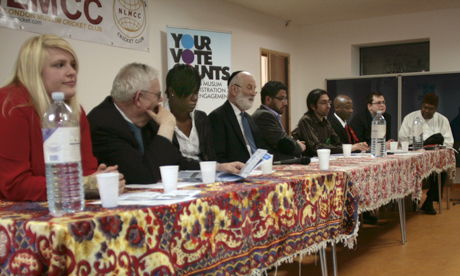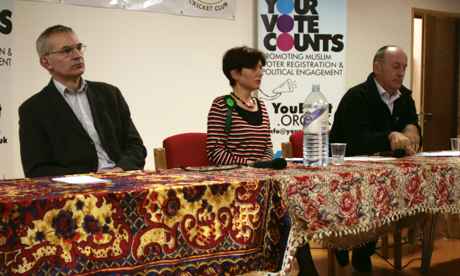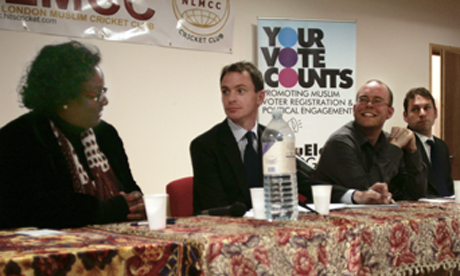North London Muslim Community Centre hosts Hackney election debates

Local council candidates for Cazenove ward at Hackney North hustings at North London Muslim Community Centre on Sunday 2 May © Hackney Citizen
After the opening prayer and a welcome from the hosts, the local council candidates for Cazenove ward kicked off the proceedings with introductions.
Standing on behalf of the Conservative party were candidates 23 year old Alina Nowobilska, along with the considerably older ex-councillor Christopher Sills and 28 year old Nailah Daley.
Representing the Liberal Democrats on the panel were Cllr Ian Sharer and Dawood Akhoon. The Green party’s Danny Bates sat between them and the Labour candidates, Kofo David, Daniel Carey-Dawes and Joko Macfoy.
Local issues raised by members of the audience included the need for a local cricket pitch, the lack of a Muslim cemetery in Hackney, calls for single sex schools, and disagreements about whether local residents or the Labour party deserve the credit for improvements to Stoke Newington Common.
Other topics included housing, planning application and local parking problems, especially around the mosque.

Hackney mayoral candidates Andrew Boff, Mischa Borris and Jules Pipe © Hackney Citizen
The recent birth of Liberal Democrat Mayoral candidate Adrian Gee-Turner’s first child meant that the Labour, Conservative and Green candidates carried on without him.
In contrast to the Hackney North and Stoke Newington parliamentary debate that was held at the same venue immediately after and concentrated on policies at a more national level, the mayoral debate focussed keenly on local issues.
The audience clearly enjoyed hearing answers from people that if elected could directly address their problems, and questions ranged from what legacy benefits Hackney would receive from the 2012 Olympic Games to why there is no decent cricket field in the borough.
Indeed, the audience notably thinned following the conclusion of the mayoral debates.
Betraying little of his £80,000 a year salary in a simple black fleece and white shirt, current Mayor and Labour candidate Jules Pipe highlighted that council tax has been frozen for the last five years, and that he is committed to keeping tax rises low in spite of the challenging economic climate.
Admitting that the physical legacy of the Olympics would amount to little more than a multi-use sports centre, Pipe emphasised that the most important outcome from the Olympics would be the creation of jobs.
He also spoke about concerns regarding cuts to nursery funding by the Learning Trust.
In answer to a question on why politicians are disconnected from local residents, Pipe seemed pleased to announce that Hackney Council was highly rated by the Audit Commission regarding how well residents feel able to influence what happens locally.
The need to give locals more opportunity to have their say in decisions that affect them was echoed by Green Party candidate Mischa Borris, and amongst other proposals she pledged to increase the number of neighbourhood forums.
Big on policy and promises, she identified inequality in the borough as a main area of concern, and stated her aim for every worker to earn a London Living Wage.
She also promised a work and employment plan to boost the local economy and local jobs, and advocated the benefits that a Hackney Youth Community Games would bring in terms of training, employment and mentoring.
Clearly no stranger to providing soundbites that make the local press, Conservative candidate Andrew Boff once again courted controversy by stating that if elected he would save the council £335,000 by promising that he and his cabinet would do the job for no pay.
Borris and Pipe were quick to point out the obvious threats to democracy if only those wealthy enough to do the job for free could stand for such positions, but Boff also attacked his rivals on more legitimate grounds.
In a challenge to Pipe’s reassurance about the flow of jobs from the Olympics, Boff stated that despite the massive spend very few opportunities had been created for local residents.
He also questioned the amount of red tape and bureaucracy under the current regime, and pledged that he would give each ward £50,000 to spend as they saw fit with no need to go through the mayor’s office.
And, with a nod to Borris, he dismissed neighbourhood forums as a “complete waste of EastEnders-watching time” and promised to do away with them altogether.

Hackney North parliamentary candidates Diane Abbott, Keith Angus, Matt Sellwood and Darren Caplan © Hackney Citizen
With the Liberal Democrats and the Green Party relying on different measurements as they argue over who is the second choice party to Labour’s 7,427 majority in Hackney North and Stoke Newington (the Liberal Democrats point out that they won the second highest number of votes at the 2005 general election, the Greens argue that they came second in 2009’s European elections) it can be argued that the Conservatives are firmly in fourth place.
However, in response to a statement made at hustings hosted by the North London Muslim Community Centre in Stoke Newington on Sunday (2 May) that the Conservatives had no chance of winning in Hackney, Conservative candidate Darren Caplan urged that the audience should vote for the party that they want to get into government.
“If you want to get rid of Labour, then you have to vote Conservative,” he said.
With less than a week to polling day, it was noticeable that this third public debate between the four main parties in the constituency was concerned more with national issues than local ones, and on the whole each candidate’s presence was more party representative rather than as an individual.
Indeed, the structure of the debate was such that the Chair took questions from the audience on particular topics – foreign policy (Iraq war, a solution for the Middle East); immigration (from inside the EU as well as outside, a possible one-time amnesty) ; environment and so on – all issues that are decided at national level which an individual MP can, at most, only influence.
However, Labour candidate Diane Abbott was quick to point out that as the local MP she had voted against many of the Government’s more unpopular motions, including the Iraq War and 90-day detention without trial, and that she would continue to do what she thought was in the best interests of her constituents.
Allying himself with Abbott was Green party candidate Matt Sellwood, who was only invited to the hustings following a late U-turn on the part of the organisers as reported in the Hackney Citizen on Saturday 1 May.
In the same friendly and agreeable manner that he has displayed in the previous debates, Sellwood noted that he and Abbott stood for many of the same things, with the exception that Abbott seemed to be working against the ideas of her party, whereas a vote for Sellwood would also be a vote for the policies of the Green Party.
And, considering the setting for the debate, it was of little surprise that the candidates agreed with majority of the concerns highlighted by the audience.
Liberal Democrat Keith Angus was not alone in noting that there was a need for a clear strategy on Afghanistan, although he also highlighted the Liberal Democrats’ pledge to bring the troops back in the course of the next Parliament.
Indeed, the opportunities for real debate were limited. Unless of course you were Darren Caplan.
Clearly resigned to the presence of the Lib Dems and Greens (“the reality is that they won’t get elected”) in what he sees as a straight two-horse race for Government, Caplan reiterated the Tory message on an annual cap for immigration, the need to investigate whether Iran has nuclear weapons and the need to incentivise people to behave in a more environmentally friendly way.
His argument that Lib Dem and Green policies will likely never see the light of day may be true, but under the current electoral system means that Caplan’s chances of representing the constituency are limited.
The outcome of the general election will likely come down to how Brown, Cameron and Clegg are perceived in the national media, and whilst the influence of each individual MP on how the country is run is somewhat limited, yesterday’s debate did give an insight into some of the personalities that could be representing Hackney North and Stoke Newington in Parliament.
Related story: Mayor speaks out over Hackney nursery cuts
